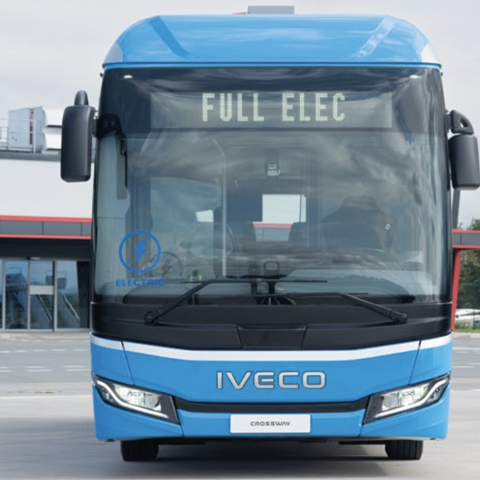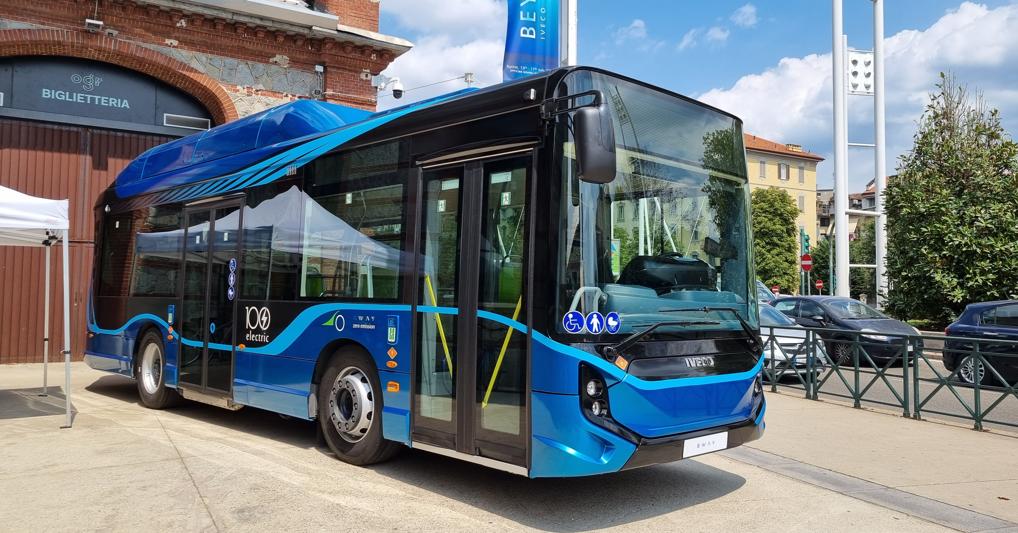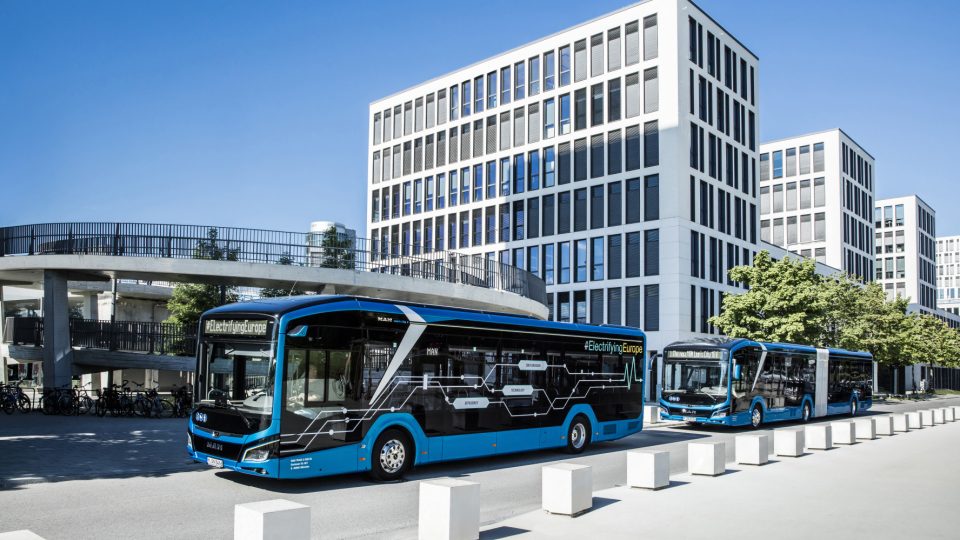Iveco Group presents new Strategic Plan and announces €600M investment in bus business (including a new e-born architecture)
According to the information shared by Domenico Nucera, President of Bus business in Iveco Group, during his speech at Iveco Group Capital Markets Day, "The next move is to invest 300 million euros for a modular, electric-born architecture that will integrate the batteries in the vehicle structure to reduce weight, add passenger capacity and increase range".

Iveco Group presented today, 14th March 2024, a new Strategic Plan, outlining objectives up to 2028 during the Company’s Capital Markets Day held today in Turin, Italy.
During the event an investment of €600 million in advanced technology between 2024 and 2028 for the bus business unit was announced. Such money will “ensure the unit remains at the forefront of the industry, particularly in the area of zero-emission vehicles”, Iveco Group states.
According to the information shared by Domenico Nucera, President of Bus business in Iveco Group, during his speech at Iveco Group Capital Markets Day, “The next move is to invest 300 million euros for a modular, electric-born architecture that will integrate the batteries in the vehicle structure to reduce weight, add passenger capacity and increase range”.
The Bus Business Unit aims to reach between €3 and €3.5 billion in Net Revenues by 2028 and is determined to increase the scale of business and optimise operations so as to almost double its profitability versus 2022, reaching 7-8% by 2028.

Iveco Group releases a new Strategic Plan
Iveco Group shares that “In its prior strategic plan from 2021, Iveco Group targeted total Net Revenues of Industrial Activities at between €16.5 and €17.5 billion by 2026 and it achieved €15.9 billion by year-end 2023, proving to be fully on track. The 2026 Adjusted EBIT margin of Industrial Activities was to reach between 5 and 6% (from 3.6% in 2019) which the Company already achieved in 2023. For the Free Cash Flow from Industrial Activities, Iveco Group targeted €500 million in 2026 and already reached more than €400 million in 2023, ahead of the previous target trajectory”.
The 2028 Iveco Group’s financial targets are, for the Industrial Activities, to achieve net Revenues of approximately €19 billion and an adjusted EBIT margin of 7 to 8%; together with a Free Cash Flow of approximately €0.9 billion.
At Group level, here the goals: Adjusted Net Income of approximately €0.9 billion; Adjusted diluted EPS exceeding €3 per share.
Gerrit Marx, CEO, Iveco Group, said, “The first of our values states that ‘we go beyond the obvious’. It embodies the soul of our Group and clearly reflects our ambition to consciously push limits and courageously set out on new pathways. We have demonstrated that we can fulfil the promises we make. Today we commit ourselves to a new plan, an acceleration of our product portfolio, stronger and more diverse partnerships, and a dial up our sustainability journey. We will deliver these commitments because the pathways and opportunities in front of us and our five business units are exciting and unlimited. Moreover, while we are drawing upon possibilities internally, we will continue exploring powerful opportunities outside. We will always go beyond the obvious.”
Domenico Nucera, President of Bus business in Iveco Group, said: “For the passenger transport industry the future is zero emission. ZE city buses should be 90% by 2030 in Europe, only 6 years from now. The bus & coach market is really under pressure. Competitors are coming. We can count on our deep customer relationship and extensive network. We optimized our supply chain and time to market. We invested in new technology launching a complete electric range and introduced our first fuel cell bus in partnership with Hyundai. We opened our net zero plant in Foggia. Now we’re ready to invest 600 million euros in advanced technology“.
What is worth mentioning, Nucera said, “Electrification is becoming the standard in the city segment. We have invested 100 million euros to launch and industrialize city buses since 2019. Our electric bus order book grew four times in 2023, as we have been winning several tenders for electric buses: Netherlands, Marseille, Rome, Turin, just to mention a few. The next move is to invest 300 million euros for a modular electric-born architecture that will integrate the batteries in the vehicle structure to reduce weight, add passenger capacity and increase range”.

Iveco Group strategic plans, four pillars – in Iveco Group’s words
The Group’s pathway is underpinned by four key pillars: Innovation, Financial Discipline, Partnerships and Sustainability. Below, in Iveco Group’s words.
Innovation
Iveco Group fully backs the investments it has made since operating as an independent Company and will invest over €5.5 billion from 2024 to 2028 in order to stay on the front end of the very fast innovation curve. The Company is driving Innovation in three key areas: Energy Transition, Artificial Intelligence (AI) & Software Defined Vehicles, and Autonomous Driving.
In Energy Transition, the Company reaffirms its aim to reach net zero carbon emissions by 2040. Instrumental to this achievement is Iveco Group’s multi-propulsion approach that includes green and zero-emission solutions. These will be backed by innovative pay-per-use business models, such as GATE – Green & Advanced Transport Ecosystem. Initially launched in Italy in mid-2023, with a focus on Iveco Group’s ZEV (Zero Emission Vehicles), GATE’s five-year ambition is to scale up, evolving into a brand-agnostic platform open to other OEMs’ vehicles.
Artificial Intelligence is central to Iveco Group’s customer-centred innovations, with Generative AI enabling significant advancements in areas such as data analysis, machine-human interaction, and software development. Software Defined Vehicles, powered by AI algorithms, are set to revolutionise the industry, simplify vehicle updates, and increase customer productivity. To remain on top of these trends, Iveco Group has inaugurated its own Software & Analytics Lab, with plans for a team of 500 specialised engineers in the coming years.
Iveco Group is already testing Autonomous Driving on public roads in Europe. For this development and its swift commercialisation, collaboration with PLUS, a global provider of self-driving truck technology, alongside other truck OEMs is fundamental. These advancements offer already today highly automated driver assistance systems to drivers and fleet owners.
Financial Discipline
Iveco Group is committed to increasing its cash generation potential and reducing seasonality where possible. At the same time, the continued focus on cost optimization and efficiency will further decrease product costs and maintain a lean SG&A structure, that by 2028 is projected to be reduced by 50 basis points versus 2023.
The Company’s prior operational excellence programme set a target to save €1 billion in the 2019-2026 timeframe. At the end of 2023, Iveco Group was in line with its goal, having set aside €300 million in operational efficiencies, plus another €600 million of improved profitability in terms of volumes, mix and pricing. With the new plan, starting with 2024, the Company is committing to €1 billion of efficiencies, split in €600 million by 2026 and another €400 million by 2028. This will be accomplished through the implementation of a detailed set of initiatives, aimed at reducing product complexity, optimizing best-cost-countries sourcing, maximizing manufacturing efficiencies, and exploiting several commercial and technical levers.
In terms of investments, the €5.5 billion projected over the next five years are split between Capex and capitalized R&D. More than 50% of total investments is not bound by compliance or regulatory restrictions, thus allowing for swift adaptation to market dynamics as and when necessary. The Group will prioritize investments that offer attractive returns and will continue to explore cooperation opportunities to optimize spending, demonstrating a disciplined investment profile.
Partnerships
Iveco Group’s strategy involves partnering with like-minded, nimble organizations to accelerate innovation.
Iveco Group is extending and deepening its partnership with Hyundai Motor Company in the area of electric heavy-duty truck solutions, including both battery electric trucks and fuel cell electric trucks for European markets. By leveraging the advanced technologies and assets of each party, the two companies expect to accelerate the transition to a sustainable future.
Since initiating their partnership in March 2022, Hyundai Motor and Iveco Group have achieved a series of significant milestones. Notably, in September 2022, they unveiled the first IVECO eDaily Fuel Cell Electric Vehicle at the IAA Transportation event in Hanover. This was followed by the debut of the IVECO BUS E-WAY H2 in October 2023 at Busworld in Brussels. Most recently, in February of this year, the two companies announced the signing of a supply agreement for an IVECO-badged all-electric light commercial vehicle for Europe, based on Hyundai’s eLCV platform.
Also today, IVECO and Ford Trucks, the heavy commercial vehicles brand of Ford Otosan, announce a non-binding Memorandum of Understanding to explore a collaboration on the development of a joint cabin structure for heavy-duty trucks compliant with the new regulations coming into force in 2028/2029. This is a preliminary step in the co-development of new products and technologies, encompassing components and systems within the cabin.
Partnerships such as these offer a triple win: they reduce costs and spending for all partners involved, ensure compliance and competitiveness, and deliver essential vehicle features without passing on excessive costs to customers. These recently announced partnerships are not yet reflected in the plan with their expected positive impacts on investments and economics.
Sustainability
By 2026, 100% of total electricity consumption will come from renewable sources. This target’s deadline was anticipated from 2030 to 2026. The Group aims to recycle 75% of industrial water at company plants worldwide by 2026, versus the previous target of 60%.
The new 2028 target for gender parity is for 30% of office positions to be held by women. Therefore, the Group will widen and raise its scope to include all female employees across every phase of their career.
Sustainability is a key pillar for Iveco Group. The Group’s actions are designed to have a positive impact on its people and on broader society.
The Company achieved some of its key sustainability targets well ahead of its 2026 goals. Iveco Group surpassed the goal of 60% water recycling across global facilities, reaching 64% by the end of 2023. By the end of last year, 24% of management positions were held by women, starting from 18.2% in 2021 and already exceeding the 2026 target set at 23%. The Net Promoter Score in customer experience increased by 20% compared to 2021, achieving the target three years ahead of original plan. The Group is also on track to meet its workplace injury reduction targets well ahead of schedule.
Building on these early achievements, Iveco Group has set even more ambitious Sustainability targets, including:
The “Unlimited Pathways” for the Group and its Business Units
Iveco Group introduces today a new structure of reporting performance by business unit, providing additional clarity on the individual performances of Powertrain, Bus, Defence, Truck and Financial Services. Each unit has its own unique “Unlimited Pathway”, reflecting its performance, future targets and potential upsides.
BUS (IVECO BUS and HEULIEZ brands)
The Bus Business Unit relies on its full offering of vehicles across all segments and on a strong focus on local communities. An investment of €600 million in advanced technology between 2024 and 2028 will ensure the unit remains at the forefront of the industry, particularly in the area of zero-emission vehicles.
The Bus Business Unit aims to reach between €3 and €3.5 billion in Net Revenues by 2028 and is determined to increase the scale of business and optimise operations so as to almost double its profitability versus 2022, reaching 7-8% by 2028.
POWERTRAIN (FPT Industrial brand)
The Powertrain Business Unit is one of the top three independent engine manufacturers globally. The Unit’s focus on both Internal Combustion Engines (ICE) and ePowertrains positions it uniquely for the shift towards alternative fuels and electrification, ensuring a sustainable and profitable future.
With a diversified portfolio and a robust capacity for innovation, the Powertrain Business Unit aims to reach between €5.5 and €6 billion in Net Revenues by 2028 (previous target at €~5 billion by 2026) and is targeting double-digit profitability, which means growing its Adjusted EBIT margin by roughly 100 basis points every year, up to 9.5-10.5% at year-end 2028.
DEFENCE (IDV and ASTRA brands)
Within Iveco Group, Defence functions as an independent and self-sufficient Business Unit, which emphasizes technological innovation, operational excellence, and strategic partnerships. Its strengths reside in its capability and adaptability to fulfil specific customer needs, thereby continuing to responsibly support numerous countries worldwide in keeping their communities safe.
The Business Unit is accelerating its growth, supported by an order book today already exceeding €4 billion. It projects to reach between €1.2 and €1.3 billion in Net Revenues by 2028, with an Adjusted EBIT margin of 12 to 13%.
TRUCK (IVECO brand)
The Truck Business Unit aims to leverage its leadership in the Light Commercial Vehicle segment with the Daily and eDaily, and in the medium-duty truck range with the well-known Eurocargo, while improving the margins of its Heavy-Duty Truck segment with the S-Way and S-eWay models. Technological innovation, financial discipline and strategic partnerships will drive its success.
The Unit aims to reach €11.0-11.5 billion in Net Revenues by 2028 with an Adjusted EBIT margin of approximately 7%.
FINANCIAL SERVICES (IVECO CAPITAL and GATE brands)
The Financial Services Business Unit is focused on maintaining its current successes while pioneering new, sustainable mobility solutions, including those provided by GATE, the 100% e-born and digital native platform for medium-long-term pay-per-use rental of electric commercial vehicles.
The Unit aims to grow its captive portfolio at between €8 to €9 billion versus €6.9 billion in 2023, with an Adjusted EBIT in the range of €130 to €150 million by 2028.








